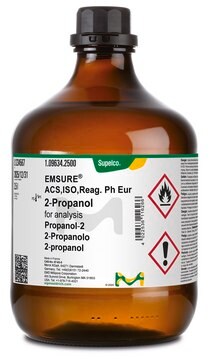PHR1314
p-Xylene
Pharmaceutical Secondary Standard; Certified Reference Material
Synonym(s):
1,4-Dimethylbenzene
About This Item
Recommended Products
grade
certified reference material
pharmaceutical secondary standard
Quality Level
Agency
traceable to NIST 3005
traceable to USP 1601849
vapor density
3.7 (vs air)
vapor pressure
9 mmHg ( 20 °C)
CofA
current certificate can be downloaded
autoignition temp.
984 °F
expl. lim.
7 %
technique(s)
HPLC: suitable
gas chromatography (GC): suitable
refractive index
n20/D 1.495 (lit.)
bp
138 °C (lit.)
mp
12-13 °C (lit.)
density
0.861 g/mL at 20 °C (lit.)
application(s)
pharmaceutical (small molecule)
format
neat
storage temp.
2-30°C
SMILES string
Cc1ccc(C)cc1
InChI
1S/C8H10/c1-7-3-5-8(2)6-4-7/h3-6H,1-2H3
InChI key
URLKBWYHVLBVBO-UHFFFAOYSA-N
Looking for similar products? Visit Product Comparison Guide
General description
Application
Analysis Note
Other Notes
Footnote
Recommended products
Signal Word
Danger
Hazard Statements
Precautionary Statements
Hazard Classifications
Acute Tox. 4 Dermal - Acute Tox. 4 Inhalation - Aquatic Chronic 3 - Asp. Tox. 1 - Eye Irrit. 2 - Flam. Liq. 3 - Skin Irrit. 2 - STOT SE 3
Target Organs
Respiratory system
Storage Class Code
3 - Flammable liquids
WGK
WGK 2
Flash Point(F)
80.6 °F - closed cup
Flash Point(C)
27 °C - closed cup
Choose from one of the most recent versions:
Certificates of Analysis (COA)
Don't see the Right Version?
If you require a particular version, you can look up a specific certificate by the Lot or Batch number.
Already Own This Product?
Find documentation for the products that you have recently purchased in the Document Library.
Our team of scientists has experience in all areas of research including Life Science, Material Science, Chemical Synthesis, Chromatography, Analytical and many others.
Contact Technical Service






